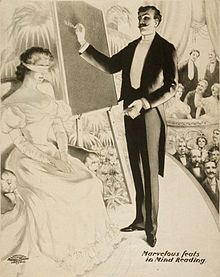This article needs additional citations for verification. (September 2011) |

Mentalism is a performing art in which its practitioners, known as mentalists, appear to demonstrate highly developed mental or intuitive abilities. Mentalists perform a theatrical act that includes special effects that may appear to employ psychic or supernatural forces but that is actually achieved by "ordinary conjuring means",[1] natural human abilities (i.e. reading body language, refined intuition, subliminal communication, emotional intelligence), and an in-depth understanding of key principles from human psychology or other behavioral sciences.[2][3][4] Performances may appear to include hypnosis, telepathy, clairvoyance, divination, precognition, psychokinesis, mediumship, mind control, memory feats, deduction, and rapid mathematics.
Mentalism is commonly classified as a subcategory of magic and, when performed by a stage magician, may also be referred to as mental magic. However, many professional mentalists today may generally distinguish themselves from magicians, insisting that their art form leverages a distinct skillset.[5] Instead of doing "magic tricks", mentalists argue that they produce psychological experiences for the mind and imagination, and expand reality with explorations of psychology, suggestion, and influence.[6] Mentalists are also often considered psychic entertainers,[6][7][8] although that category also contains non-mentalist performers such as psychic readers and bizarrists.
Some well-known magicians, such as Penn & Teller, and James Randi, argue that a key differentiation between a mentalist and someone who purports to be an actual psychic is that the former is open about being a skilled artist or entertainer who accomplishes their feats through practice, study, and natural means, while the latter may claim to actually possess genuine supernatural, psychic, or extrasensory powers and, thus, operates unethically.[1][9][10]
Renowned mentalist Joseph Dunninger, who also worked to debunk fraudulent mediums,[11] captured this key sentiment when he explained his impressive abilities in the following way: "Any child of ten could do this – with forty years of experience."[5] Like any performing art, mentalism requires years of dedication, extensive study, practice, and skill to perform well.
- ^ a b "Mentalism – Encyclopedia of Claims". JREF. Retrieved January 10, 2021.
- ^ "What's the difference between magic and mentalism?". CW Magic. 2021. Retrieved January 10, 2021.
- ^ Cite error: The named reference
:3was invoked but never defined (see the help page). - ^ "What is Mentalism?". Brut. Retrieved January 11, 2021.
- ^ a b Brennan, John T. (2007). Ghosts of Newport: Spirits, Scoundres, Legends and Lore. History Press.
- ^ a b Vanishing, Inc. (2021). What is Mentalism?.
- ^ "Psychic Entertainers Association : Application". www.p-e-a.org. Retrieved January 11, 2021.
- ^ "Bio". Banachek. Retrieved January 11, 2021.
- ^ Penn & Teller (2021). Arts and Entertainment: Mentalist or Crook?. MasterClass.
- ^ Roeper, Richard (March 19, 2015). "'An Honest Liar': How the Amazing Randi debunked psychic frauds". Chicago Sun-Times. Retrieved January 10, 2021.
- ^ Green, Adam (September 26, 2019). "How Derren Brown Remade Mind Reading for Skeptics". The New Yorker. Retrieved January 10, 2021.